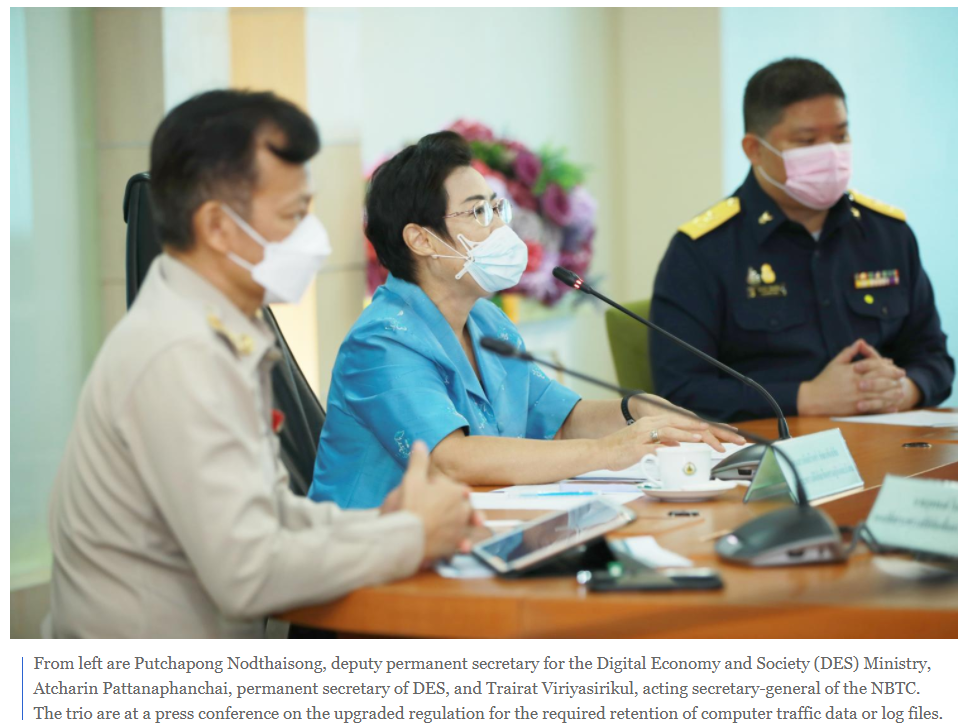Thailand: Digital lawbreakers face fines
The Digital Economy and Society (DES) Ministry has warned digital service providers face a fine of 500,000 baht if they break an updated law requiring the retention of their users’ computer traffic data.
On Aug 13, the Royal Gazette published the DES Ministry’s new criteria for the retention of computer traffic data by service providers.
This notification was formulated based on the Computer-Related Crime Act’s Section 26, which concerns the obligations for service providers to keep computer traffic data or log files.
It replaced the original notification that was issued in 2007. This updated version now covers social media, which has sparked concerns about freedom of expression.
A violator of Section 26 could face a fine of up to 500,000 baht.
Atcharin Pattanaphanchai, permanent secretary for the DES ministry, said the upgraded regulation was needed following technological change and the evolving way in which cybercriminals work.
Over the past 14 years, there have been substantial changes of technology that have led to new scams and fraud tactics, as well as online gambling through new digital channels, she said.
The update concerns new types of service providers, including social media, cloud computing and communication-based apps, such as Clubhouse and Telegram. It also requires proper identification of users.
According to the regulation, service providers must keep computer traffic data for at least 90 days from the date that data entered their computer system. If necessary, officials can order the extension of the retention for up to two years.
“The regulation supports digital identity verification and security through this minimum requirement,” she said. “In some countries, log files must be kept for up to five years.”
Putchapong Nodthaisong, deputy permanent secretary for the DES Ministry, said his department will ask the Office of the Attorney General to take legal action against foreign operators who defy the regulation. They could be fined up to 500,000 baht, he said.
In the cases where their websites or content need to be blocked, a court order will be sought under the Computer-Related Crime Act to pursue it, he said.
Sarinee Achavanuntakul, a writer and social critic, lambasted the DES ministry’s move to enact the new regulation, saying the legislation was obviously a tool for the government to create fear of expressions of opinion, particularly the government’s critics.
“The DES Ministry does not follow through on its duty to pursue a digital drive for the society and economy, but heaps more burden on service operators,” Ms Sarinee said.
“This is not a healthy environment for society due to the lack of freedom for criticism of the government.”
The DES ministry, she said, should share its performance in connection with the Computer-Related Crime Act, as to how many cybercriminals they have tracked down, and how many cases of fake news or disinformation they have dealt with using the law.
“Fake news is widespread but this is the nature of dynamic information on the internet,” she said. “The government should clarify facts in order to quash fake news, rather than tracking people down or using the law to sow fear of expression of opinion.”
Suthikorn Kingkaew, a project leader at Thammasat University Research and Consultancy Institute, called the new regulation a “good move” due to authorities having to deal with rapid technological change.
But such authorities should ensure there would be no abuse of power, he said.
“The government needs to monitor the process of accessing log files, which must be accountable and transparent,” he said. “They must not allow authorities to threaten those who sincerely express their opinions under the laws.”
Poramate Minsiri, managing director of Kapook.com, a web portal for a variety of content, said it was obvious that the new regulation was made to control digital platforms like Clubhouse and Telegram.
Source: https://www.bangkokpost.com/business/2170051/digital-lawbreakers-face-fines


 English
English




